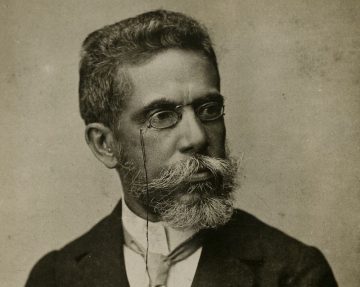Margaret Jull Costa and Robin Patterson at The Paris Review:
 The literary models Machado mentions in his preface are Laurence Sterne, Xavier de Maistre, and Almeida Garrett, but behind the title there may also be an ironic reference to Chateaubriand’s Mémoires d’outre-tombe (Memoirs from Beyond the Grave), published posthumously in 1849 and 1850. Those memoirs filled two volumes; their author was a diplomat, politician, writer, historian, and supposed founder of French Romanticism. Brás Cubas’s posthumous memoirs (which are written from beyond the grave) fill a scant two hundred pages and the narrator is, by his own blithe admission, a complete mediocrity whose life can be summed up by a series of negatives. Echoes of Sterne, Maistre, and Garrett are definitely all there in the brief chapters, the oblique chapter titles, the non sequiturs, and the half-baked philosophy, and yet in many ways the book is also a straightforward nineteenth-century realist novel, with its jabs at the hypocrisy of middle-class society, and the standard themes of adultery, money, marriage, miserliness, and profligacy. Machado manages, seamlessly, to combine realism and the fantastic, and the novel’s fragmentary, allusive style and its frequent inclusion of us, the readers, strikes us now as very modern, as does Brás Cubas’s insistence, more than once, that this is not a novel at all.
The literary models Machado mentions in his preface are Laurence Sterne, Xavier de Maistre, and Almeida Garrett, but behind the title there may also be an ironic reference to Chateaubriand’s Mémoires d’outre-tombe (Memoirs from Beyond the Grave), published posthumously in 1849 and 1850. Those memoirs filled two volumes; their author was a diplomat, politician, writer, historian, and supposed founder of French Romanticism. Brás Cubas’s posthumous memoirs (which are written from beyond the grave) fill a scant two hundred pages and the narrator is, by his own blithe admission, a complete mediocrity whose life can be summed up by a series of negatives. Echoes of Sterne, Maistre, and Garrett are definitely all there in the brief chapters, the oblique chapter titles, the non sequiturs, and the half-baked philosophy, and yet in many ways the book is also a straightforward nineteenth-century realist novel, with its jabs at the hypocrisy of middle-class society, and the standard themes of adultery, money, marriage, miserliness, and profligacy. Machado manages, seamlessly, to combine realism and the fantastic, and the novel’s fragmentary, allusive style and its frequent inclusion of us, the readers, strikes us now as very modern, as does Brás Cubas’s insistence, more than once, that this is not a novel at all.
more here.
